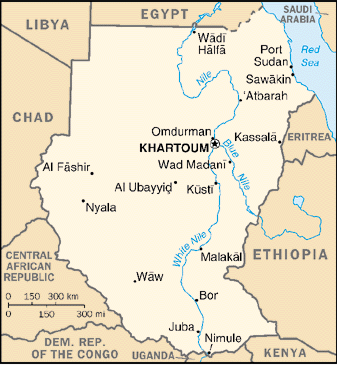On 9th of July, 2011 Southern Sudan will celebrate its birth as the world’s newest country. The coming secession is the final chapter in what was one of Africa’s longest-running civil wars. For twenty-two years, southern liberation fighters battled for independence, leading to the signing of the Comprehensive Peace Agreement (CPA) in 2005. That agreement allowed for a six-year interim period culminating in a vote on secession, which Southerners voted for by an overwhelming majority earlier this year.
A report from the Security Council Organization on Southern Sudan states:
On 20 June, 2011 the government of Sudan and the Sudan People’s Liberation Movement (SPLM) signed an agreement on temporary arrangements for the administration and security of the Abyei area. The agreement provides for the withdrawal of military forces—both Khartoum’s Sudan Armed Forces (SAF) and Southern Sudan’s Sudan People’s Liberation Army (SPLA)—immediately following the deployment of an Interim Security Force for Abyei (ISFA) composed of a brigade of Ethiopian troops. The agreement also indicates that an Abyei police service shall be established to deal with particular issues related to nomadic migration.
The agreement also established the Abyei Joint Oversight Committee (AJOC), which is to be composed of four members, with each party nominating two representatives. On 27 June, 2011 the Security Council also adopted resolution 1990 authorizing for six months a mission called the UN Interim Security Force for Abyei (UNISFA) that shall comprise a maximum of 4,200 military personnel, 50 police and appropriate civilian support with the following mandate:
- monitor and verify the redeployment of armed groups from Abyei Area, as defined by the Permanent Court of Arbitration;
- participate in relevant Abyei Area bodies as stipulated in the agreement;
- assist in de-mining;
- facilitate humanitarian access;
- strengthen the capacity of the Abyei Police Service; and
- provide security for oil infrastructure
The UN Security Council will vote tomorrow on a new mission to South Sudan. The current United Nations Missions in Sudan (UNMIS) has to leave North Sudan by July 9, 2011 when the Republic of South Sudan finally comes into being. All the various agencies working in Sudan have in the last few days tried to put up a case for a new revitalized force which would have a mandate to enforce peace given the current security situation in Border States as well as Abyei and South Kordofan.
Also from a report by Oxfam International indicates:
Inadequate numbers of peacekeepers for the next mission in South Sudan risk endangering thousands of lives and future stability.
From my colleague Ugandan blogger, Rosebell’s Blog; I learned about how violence has escalated in the past couple of weeks in Abyei, Southern Kordofan and across southern Sudan which has forced over 180,000 people to flee their homes. The UN has called on the Security Council to send a strengthened Mission to the border as the situation is very tense and the country needs all the support it can to protect its population. The UN asked for 7000 troops but reports indicate talks are going very badly as the UK, US and France are trying to trim the size of the Mission, its budget and its staff.
Related articles
- A strong UN force on North-South border needed to realise South Sudan independence (rosebellkagumire.com)
- Countdown to South Sudan independence (and news from neighboring Chad) (aleksandreia.wordpress.com)
- Sudan: Border fighting could unravel the peace process| Peter Moszynski (guardian.co.uk)


